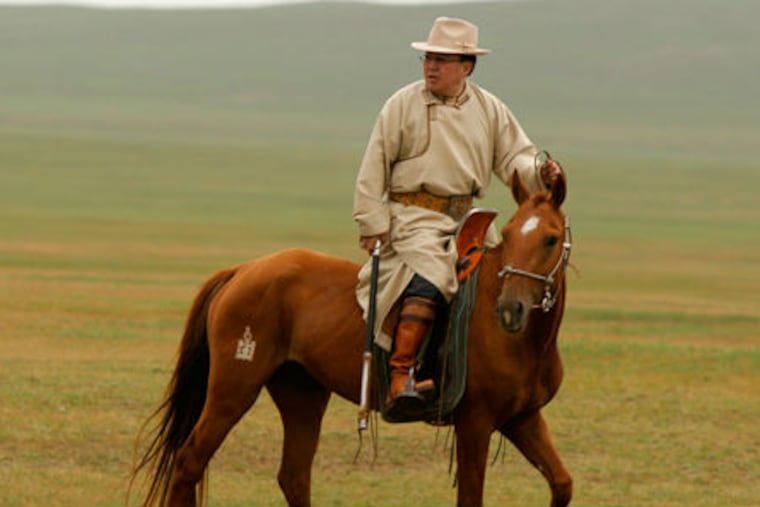Mongolia's president to visit Philadelphia, thanks to Orchestra tie
The Philadelphia Orchestra's growing relationship with the democratic government of Mongolia is set to intensify this month. In a prelude to the Philadelphia Orchestra's tour visit to the capital city of Ulaanbaatar in June 2017 announced earlier this year, the country's president Tsakhiagiin Elbegdorj will make a state visit to Philadelphia on Sept. 23.

The Philadelphia Orchestra's growing relationship with the democratic government of Mongolia is set to intensify this month. In a prelude to the Philadelphia Orchestra's tour visit to the capital city of Ulaanbaatar in June 2017 announced earlier this year, the country's president Tsakhiagiin Elbegdorj will make a state visit to Philadelphia on Sept. 23.
The agenda includes receptions, an afternoon Philadelphia Orchestra concert, and an appearance at University of Pennsylvania's American Center for Mongolian Studies.
"Mongolia feels that it's time to make a strong cultural statement, and I want that to be with the Philadelphia Orchestra," said Allison Vulgamore, president and CEO of the orchestra, who issued the invitation to Elbegdorj. She credits several congressmen with making letters of introduction and doing other things to help facilitate the visit. She especially mentioned Rep. Brendan Boyle (D., Pa.) of the House Committee on Foreign Affairs.
While such events are often about furthering mutual business interests, Vulgamore said the invitation "didn't come from a place of money. . . . It's a chance to know a quickly emerging country."
The Mongolian president has been a periodic U.S. visitor as part of the United Nations General Assembly, where he'll be prior to Sept. 23. Philadelphia visits by such heads of state are uncommon, and even rarer is a state visit instigated by a cultural institution such as the Philadelphia Orchestra.
"This visit marks a significant moment in cross-cultural affairs and demonstrates Philadelphia's role as a global destination," said Philadelphia Mayor Jim Kenney in a statement released by the orchestra. Vulgamore sees the event as building on last year's visit by Pope Francis and this year's Democratic National Convention.
"It speaks well for Philadelphia being a hub of cultural exchange and advocacy for the Philadelphia Orchestra's work," said Vulgamore. "We're also seeing reciprocity. The China NCPA Orchestra played at the Kimmel Center. The Shanghai Philharmonic will be coming here. ... [For Mongolia] the next step is for us to play in their hall."
An Aug. 29 letter from Secretary of State John Kerry to the orchestra's music director, Yannick Nézet-Séguin, said, "Your performance next year will exemplify the growing cultural and people-to-people ties between the United States and Mongolia. ... "
Most certainly, the president's visit should raise awareness of post-Soviet Mongolia. Although it is one of the most sparsely populated countries in the world (an estimated 3 million people in 603,900 square miles), its mining industries have been partly responsible for an annual economic growth of between eight and 11 percent in recent years. In contrast to the ups and downs of U.S. relations with China, Mongolia has proclaimed the United States to be its third neighbor (its literal neighbors being Russian and China). Elbegdorj champions causes such as environmental protection, women's rights and abolition of the death penalty.
Born into a family of nomads (nomads still account for 30 percent of Mongolia's population), the 53-year-old Elbegdorj worked in a copper factory before being drafted into the army in 1982. He showed literary talent when writing for the army newspaper, and studied Soviet journalism at Lviv Polytechnic National University in Ukraine.
Later, after the 1990 democratization Mongolia, Elbegdorj played a key role in a different kind of journalism, founding the country's first modern independent newspaper and television station. Elbegdorj went on to serve three terms as prime minister (1998, 2004, and 2006). After his first term, he came to the United States to study at the University of Colorado Boulder's Economic Institute and then Harvard University where he he earned a degree in public administration.
In some ways, the orchestra's relationship with Mongolia echoes its 1973 pioneering visit to China, which has evolved into annual residencies over the past several years. Mongolia already has its own musical institutions, suggesting that its relationship to western art is rather more evolved than China's was in 1973, which could create a ready foundation for regular Philadelphia Orchestra visits.
But at this point, Vulgamore declines to look into the future: "We don't make any assumptions about that, but it's a wonderful idea ... to discuss after we pull off year one."